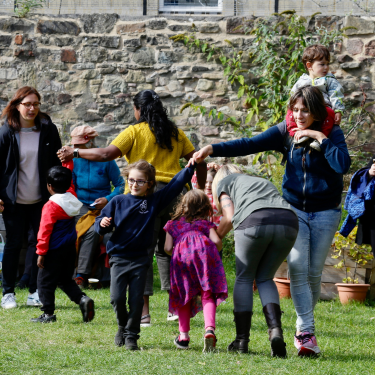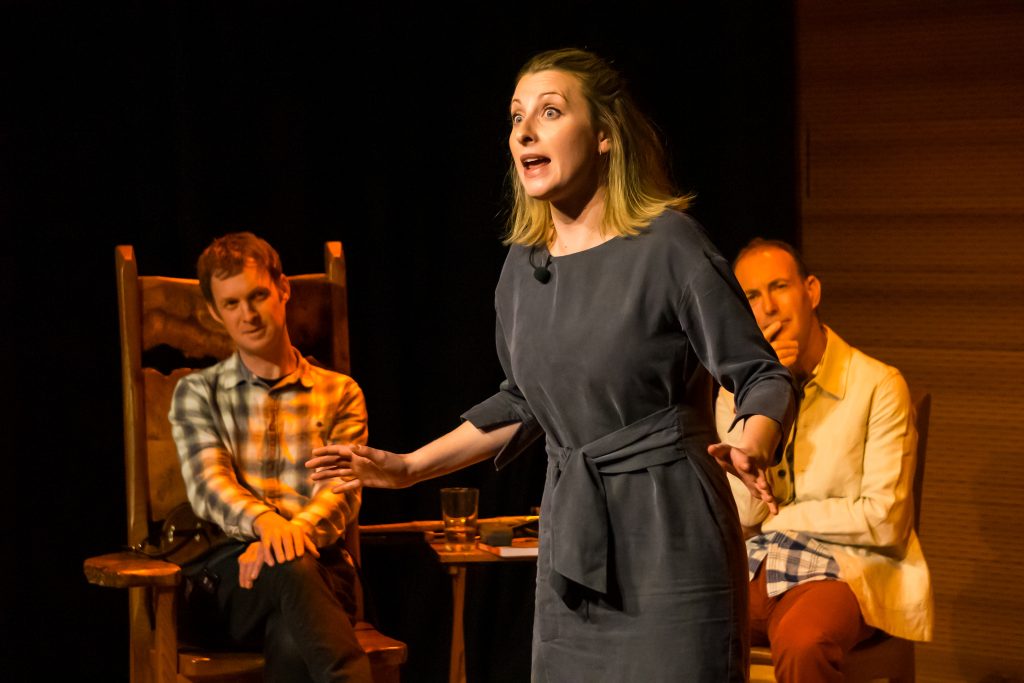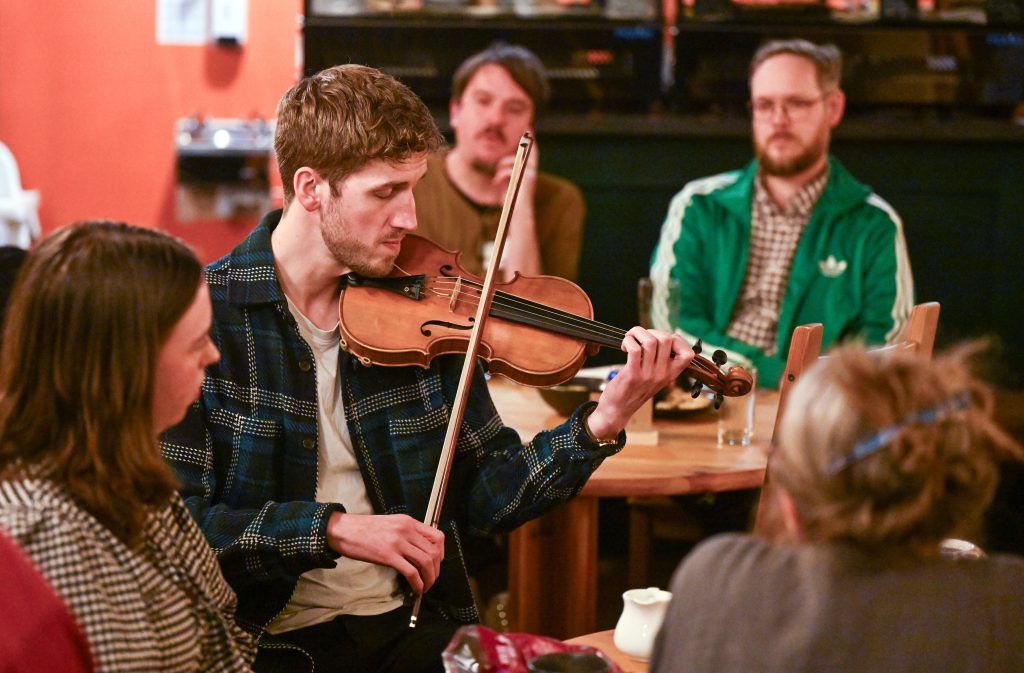The Traditional Dance Forum of Scotland and TRACS (Traditional Arts and Culture Scotland) in partnership with Moray House School of Education and Sport, University of Edinburgh are delighted to announce full details of its third Pomegranates festival programme which this year starts as early as 24 February 2024 with a series of related events and culminates in a long festival weekend 25-30 April 2024 at the Scottish Storytelling Centre and various venues across Edinburgh.
 The Pomegranates festival, supported by Creative Scotland’s Traditional Dance Target Fund, celebrates Scottish traditional dance and traditional dance practised by cultural migrant communities across Scotland. It provides a platform to showcase new dance commissions and residencies accompanied by live music, poetry, and art; and invites audiences to participate in ceilidhs, workshops (both in person and live streamed), tours, and talks about traditional dance from Scotland and around the world.
The Pomegranates festival, supported by Creative Scotland’s Traditional Dance Target Fund, celebrates Scottish traditional dance and traditional dance practised by cultural migrant communities across Scotland. It provides a platform to showcase new dance commissions and residencies accompanied by live music, poetry, and art; and invites audiences to participate in ceilidhs, workshops (both in person and live streamed), tours, and talks about traditional dance from Scotland and around the world.
This year the festival’s choreographer in residence is MC, dancer, spoken word artist and director Jonzi D who is widely recognised for his influence on the development of the UK British hip hop dance and theatre scene. As choreographer-in-residence Jonzi D will be working with 20 Scotland-based traditional dancers who will perform alongside him on Monday 29 April and showcase their work as part of the festival’s International Dance Day celebrations. Working alongside Jonzi D to create this new dance piece will be poet Jim Mackintosh who is author of We are Migrant; poet, playwright and BBC broadcaster Ian McMillan; and contemporary visual artist and human rights activist Mare Tralla.
Jonzi D, choreographer-in-residence at Pomegranates 2024. Photo © Dami Rock @darklingdami
Another highlight this year will be a newly-devised showing of Elegies, which premiered during the Scottish International Storytelling Festival 2023. This performance, which weaves together dance theatre, spoken word and live music, is a dance adaptation of the poetry book Elegies for the Dead in Cyrenaica (1948) by Hamish Henderson (1919-2002), a soldier-poet, singer-songwriter and scholar-folk revivalist of Scotland. Set in a dancehall and a desert during the Second World War, it embodies ceilidh, jive, swing and lindy hop, accompanied by Henderson’s poems read by spoken word artists Morag Anderson and Stephen Watt, and live music and vocals from multi-instrumentalist Cera Impala.
Plus, there will be a talk by Rudiger Hes, President of Europeade who will give an overview of the history of Europeade which is the largest festival of folk dance and music held in a different European country each year, whilst on an initial visit to Scotland to explore the possibility of various cities hosting the 61st edition in 2026.

The festival will also include two new exhibitions – Dance Around the World (3-30 April) a display of traditional dance books and artefacts from Scotland and beyond, at Edinburgh’s Central Library accompanied by craft maker-led hands-on workshops; and Vengefully Changed Allegiance by Alison Harm (23-30 April) which looks at the role of tartan in traditional dance. Alison, who is a Scottish fashion designer and the owner of clothing label Psychomoda, will also present a catwalk-style fashion show of her sustainable tartan creations on the evening of 25 April.
Over the festival weekend there will be a choice of curatorial tours of the exhibitions, as well as two specially-commissioned tours of Edinburgh’s Old and New Town’s dance history, looking at the under-recognised female dance teachers of the past, with writer and storyteller Donald Smith and dance historian Alena Shmakova.
For the first time the festival will run a Family Day featuring a ceilidh for all led by Caroline Brockbank of CeilidhKids, and a matinee showcase by traditional dance artists who are in residence at primary schools across Edinburgh and the Lothians, and Bulgarian and Ukrainian language schools in the city.
 Family Ceilidh led by Caroline Brockbank of CeilidhKids at Abbeyhill Primary School Photo © Scibor Lipinski
Family Ceilidh led by Caroline Brockbank of CeilidhKids at Abbeyhill Primary School Photo © Scibor Lipinski
Finally, before the festival weekend kicks off, there will be a the full day of CPD (Continuing Professional Development) workshops on 20 April celebrating 12 different types of world traditional dance, from South Africa to the South of Scotland, i.e. excavating and reviving a series of traditional dances set to Scottish Lowland and Borders pipes. The workshops, which will provide inspiration for the new festival commissions by Jonzi D, Mare Tralla and Jim Mackintosh, are a key aspect of the ongoing festival partnership with the Moray House School of Education and Sport, University of Edinburgh and will culminate on 30 April with Jonzi’s keynote festival lecture on decolonising the expressive arts curriculum – open to all students, staff and the general public.
All festival events are presented on a ‘pay what you can‘ basis, while the exhibitions and the related hands-on traditional craft activities at Edinburgh’s Central Library are free and open to all.
Vanessa Boyd, Interim Head of Dance at Creative Scotland commented:
“The upcoming Pomegranates Festival in the capital promises a vibrant gathering of artists uniting to celebrate and present a diverse tapestry of Scottish traditional dance alongside traditional dance from migrant communities and various cultures. What makes this festival truly exceptional is the breadth of the programming provided by Traditional Dance Forum of Scotland which will enable many more people the opportunity to experience and engage with a strong mix of traditional dance from Scotland and around the world.”
Wendy Timmons, Festival Producer and Senior Lecturer in Dance Science and Education at Moray House School of Education and Sport, University of Edinburgh said:
“The University is delighted to be working in partnership with Traditional Dance Forum Scotland on this year’s Pomegranates Festival. The festival is an important part of our year-round work with schools and communities in Edinburgh, and key for our academic studies of different styles of dancing currently practised in Scotland. Scottish Dancing has its place in the festival, but it is the dances from all the different cultures living in Scotland, and the interconnections these create, that make this festival unique. Pomegranates is grounded in diversity and our role at the University is to ensure it reaches the broadest audiences possible through our livestreaming and academic work. I couldn’t be more thrilled with the line-up in this year’s programme and am looking forward to an absolutely fantastic weekend of dance.”
Iliyana Nedkova, Festival Producer and Curator of the Traditional Dance Forum of Scotland said:
“It is so satisfying to see that the pomegranate ruby seeds of traditional dance that we planted for the first time in spring 2022, once again blossom into Scotland’s springtime festival for world trad dance. As a new festival born in times of uncertainty, displacement and border restrictions, we were inspired by a poem by Ian McMillan that captured the zeitgeist. Little did we know that Ian would become our first poet-in-residence. Three years on, we remain committed to this duet of poetry and pragmatism. I believe we are the only festival home for the diverse dance forms of the different migrant communities across Scotland from Indonesia and Ireland to Costa Rica and the Congo who all share the primary ingredient of world dance – the triple step.”
Tickets available at https://linktr.ee/pomegranatesfest
The Pomegranates Festival is Scotland’s springtime festival of international traditional dance. Initiated and produced by Traditional Dance Forum of Scotland it is presented in partnership with Traditional Arts and Culture Scotland, Moray House School of Education and Sport, University of Edinburgh, Edinburgh City Libraries, Dance Base and the Scottish Storytelling Centre. The Pomegranates Festival is funded by TRACS (Traditional Arts and Culture Scotland), Creative Scotland Traditional Dance Target Fund, The William Syson Foundation and Scottish Community Alliance through Pockets and Prospects Fund.









